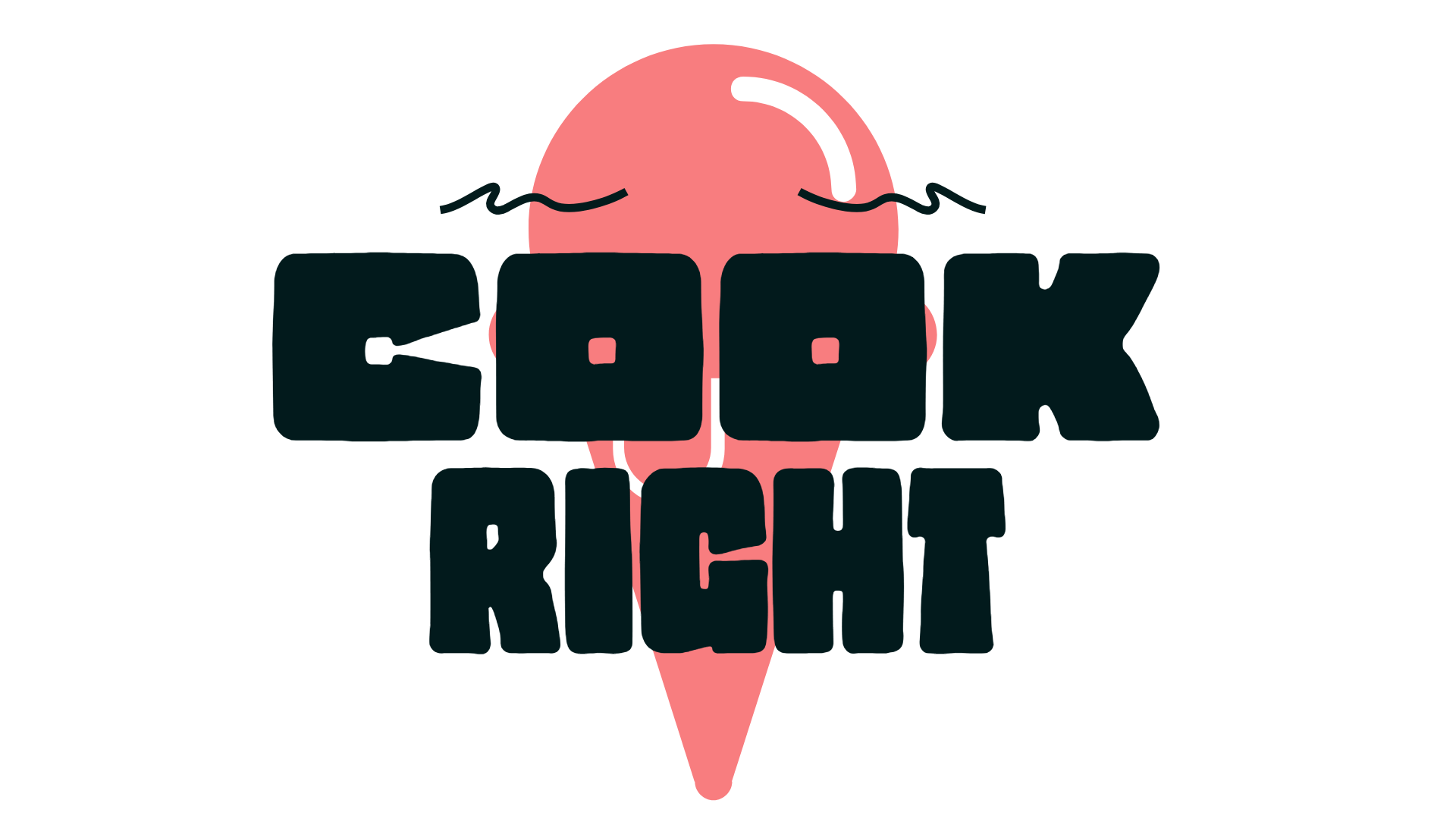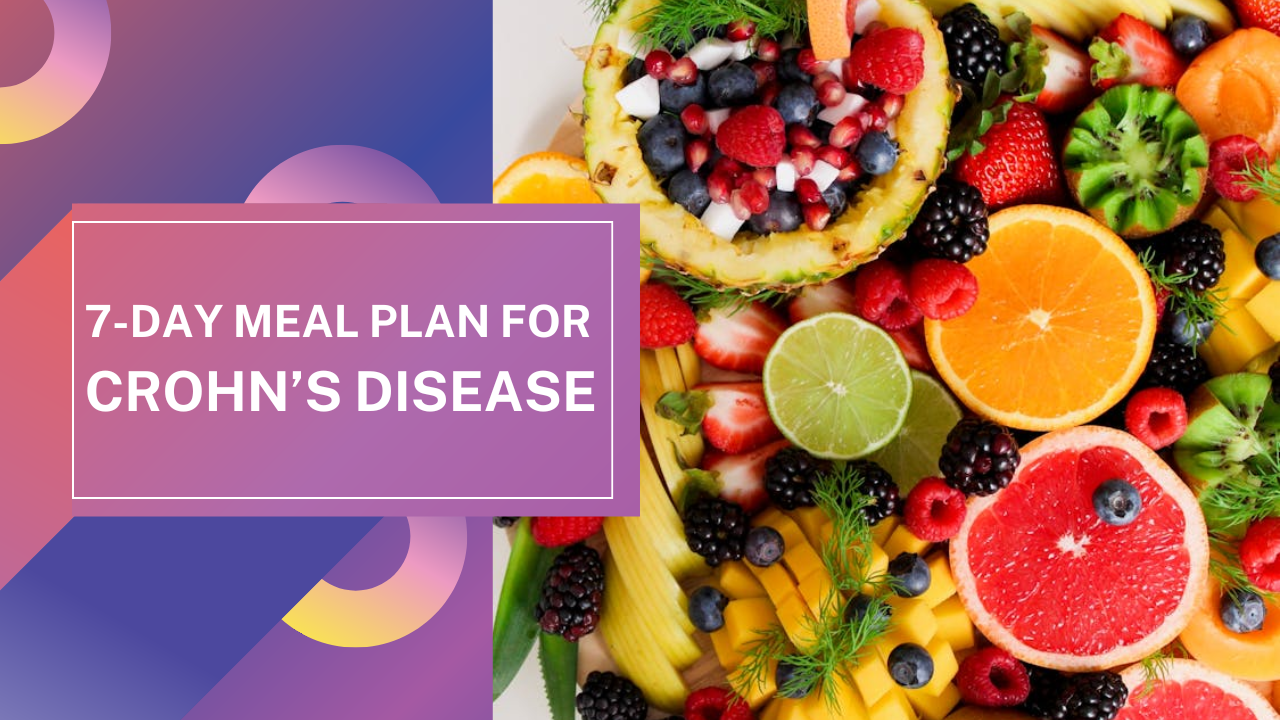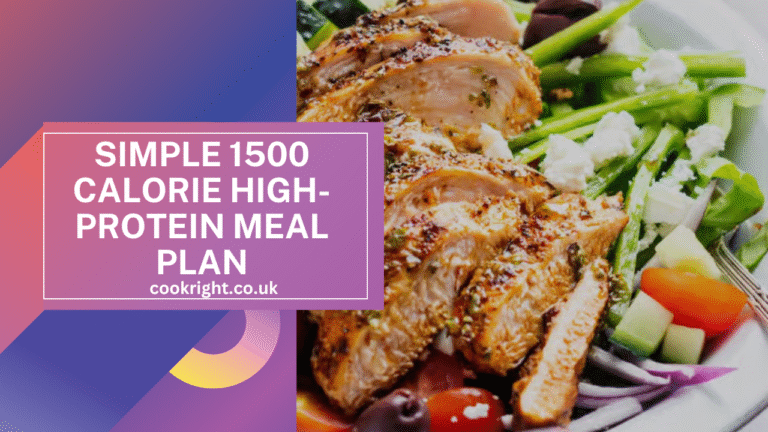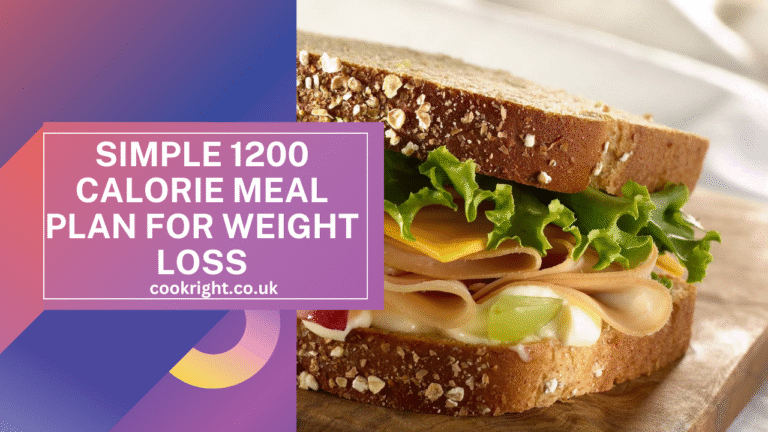Crohn’s Disease is a chronic inflammatory condition of the gastrointestinal tract that can significantly impact a person’s quality of life. For those living with Crohn’s, managing symptoms like abdominal pain, diarrhea, fatigue, and nutritional deficiencies is a daily challenge. While medication and medical treatments play a crucial role in managing the disease, diet and nutrition can also have a profound impact on symptom management and overall well-being.
Eating the right foods can help reduce inflammation, avoid flare-ups, and maintain a healthy nutritional status, which is often compromised in individuals with Crohn’s Disease. However, knowing what to eat can be tricky since food tolerances vary widely among individuals. That’s why it’s essential to have a well-thought-out meal plan tailored to your unique needs and preferences.
In this blog post, we’ll explore a 7-day meal plan specifically designed for individuals with Crohn’s Disease. This plan focuses on nutrient-dense, easy-to-digest foods that are generally well-tolerated, aiming to support your body’s nutritional needs without aggravating symptoms. Whether you’re in a flare-up or aiming to maintain remission, this meal plan can be a helpful guide in navigating your dietary journey with Crohn’s Disease.
Disclaimer: Always consult with a healthcare professional or a registered dietitian before making any significant changes to your diet, especially when managing a condition like Crohn’s Disease.
Understanding Crohn’s Disease and Diet
Crohn’s Disease is a type of inflammatory bowel disease (IBD) that causes chronic inflammation of the gastrointestinal (GI) tract. This inflammation can affect any part of the GI tract, from the mouth to the anus, but it most commonly affects the end of the small intestine (ileum) and the beginning of the colon. Symptoms can vary from mild to severe and often include abdominal pain, diarrhea, fatigue, weight loss, and malnutrition.
While the exact cause of Crohn’s Disease remains unknown, it is believed to result from a combination of genetic, environmental, and immune system factors. The body’s immune system mistakenly attacks healthy tissue in the GI tract, leading to inflammation. Flare-ups can occur unpredictably and may be triggered by various factors, including stress, infections, and diet.
The Role of Diet in Managing Crohn’s Disease
Diet plays a significant role in managing Crohn’s Disease. Although diet alone cannot cause or cure Crohn’s, certain foods and eating patterns can influence the frequency and severity of symptoms. During flare-ups, individuals with Crohn’s often experience heightened sensitivity to specific foods, which can exacerbate symptoms like cramping, bloating, and diarrhea.
A well-balanced diet is crucial for maintaining overall health, supporting the immune system, and preventing nutritional deficiencies that are common in Crohn’s Disease due to malabsorption. However, because food tolerances can vary widely among individuals with Crohn’s, there is no one-size-fits-all diet. Instead, it’s about finding what works best for your body, which can involve some trial and error.
Key Dietary Considerations
When managing Crohn’s Disease, it’s essential to focus on:
- Easy-to-Digest Foods: Choose foods that are gentle on the digestive system, especially during flare-ups. These include cooked vegetables, lean proteins, and low-fiber grains.
- Avoiding Trigger Foods: Common triggers can include high-fiber foods, dairy, spicy foods, caffeine, and alcohol. Identifying personal triggers through a food diary can help tailor your diet.
- Nutrient-Dense Choices: Since nutrient absorption can be compromised, prioritize foods rich in vitamins, minerals, and other essential nutrients. Foods fortified with vitamins, along with supplements as recommended by a healthcare provider, can help meet your nutritional needs.
- Staying Hydrated: Diarrhea and inflammation can lead to dehydration, so it’s vital to drink plenty of fluids, especially water, and consider electrolyte solutions if needed.
Managing Crohn’s Disease with diet is about striking a balance that minimizes symptoms while ensuring adequate nutrition. The 7-day meal plan provided in this post aims to offer a practical guide with meal ideas that are typically well-tolerated and designed to support your health journey with Crohn’s Disease.
Importance of Diet in Managing Crohn’s Disease Symptoms:
Diet plays a critical role in managing Crohn’s disease, as certain foods can either trigger or alleviate symptoms. While there is no universal diet for everyone with Crohn’s, making thoughtful dietary choices can significantly improve quality of life. A proper diet helps reduce inflammation, control bowel movements, and ensure the body gets essential nutrients despite digestive challenges.
By avoiding trigger foods—such as high-fiber, fatty, and spicy options—and focusing on easily digestible, nutrient-rich meals, individuals with Crohn’s can better manage flare-ups, reduce discomfort, and promote long-term digestive health. Tailoring your diet to the condition allows for more stability in daily life and fewer disruptions caused by painful symptoms.
Key Nutrients and Foods for Crohn’s Disease
Managing Crohn’s Disease involves not just avoiding trigger foods, but also ensuring that your body gets the essential nutrients it needs to function optimally. Due to inflammation and potential damage to the intestinal lining, individuals with Crohn’s are at risk of various nutritional deficiencies. Prioritizing nutrient-dense foods that are easier to digest can help mitigate some of these risks and support overall health.
Essential Nutrients for Crohn’s Disease
- Protein: Protein is crucial for repairing body tissues, especially when inflammation is present. Include easily digestible protein sources like eggs, lean meats, fish, and tofu. During flare-ups, opt for soft or pureed proteins to reduce digestive stress.
- Iron: Iron deficiency is common in Crohn’s due to blood loss, malabsorption, or reduced intake. To boost iron levels, incorporate foods like lean red meat, poultry, and iron-fortified cereals. Pair these with vitamin C-rich foods, such as oranges or bell peppers, to enhance absorption.
- Calcium and Vitamin D: These nutrients are vital for bone health, particularly since individuals with Crohn’s are at increased risk of osteoporosis. Include lactose-free dairy products, fortified plant milks, leafy greens, and fatty fish like salmon. Vitamin D supplements may be necessary if levels are low.
- B Vitamins (especially B12, B6, and Folate): B vitamins support energy levels and overall cell function. Deficiencies, especially in B12, are common in Crohn’s. Include sources like eggs, poultry, fortified cereals, and leafy greens. In some cases, supplements or B12 injections may be needed.
- Omega-3 Fatty Acids: Omega-3s have anti-inflammatory properties that may help reduce intestinal inflammation. Good sources include fatty fish (like salmon, mackerel, and sardines), flaxseeds, and chia seeds. If these foods are not well tolerated, consider a high-quality fish oil supplement.
- Magnesium: Magnesium is crucial for muscle and nerve function but can be depleted by chronic diarrhea. Include magnesium-rich foods like bananas, spinach, and avocados, which are generally well-tolerated.
Foods Generally Well-Tolerated by Individuals with Crohn’s Disease
- Cooked Vegetables: Raw veggies can be tough on the digestive tract, so opt for cooked or pureed vegetables like carrots, zucchini, and squash, which are easier to digest.
- Low-Fiber Fruits: Fruits like bananas, melons, and applesauce are typically tolerated better than high-fiber options. They provide essential vitamins and hydration without irritating the gut.
- Refined Grains: During flare-ups, refined grains like white rice, pasta, and sourdough bread can be easier on the digestive system compared to whole grains.
- Lean Proteins: Chicken, turkey, and fish are excellent protein sources that are gentle on the gut. Avoid frying; instead, bake, grill, or steam for easier digestion.
- Lactose-Free Dairy or Dairy Alternatives: Many with Crohn’s are lactose intolerant. Lactose-free milk, hard cheeses, and plant-based alternatives like almond milk can provide calcium and vitamin D without triggering symptoms.
- Healthy Fats: While high-fat foods can be problematic, small amounts of healthy fats like olive oil, avocado, and nut butters are usually well tolerated and can provide essential calories.
Foods to Avoid or Limit
- High-Fiber and Raw Foods: Foods like raw vegetables, nuts, seeds, and whole grains can be harsh on the digestive tract, especially during flare-ups.
- Spicy and Fatty Foods: Spicy foods can irritate the gut lining, and high-fat foods may cause discomfort and worsen diarrhea.
- Dairy Products: Due to lactose intolerance, many with Crohn’s should avoid or limit milk, soft cheeses, and ice cream.
- Caffeine and Alcohol: Both can stimulate the GI tract and worsen symptoms such as diarrhea and cramping.
Balancing your diet with these key nutrients and focusing on easily digestible foods can help manage symptoms and improve quality of life with Crohn’s Disease. The 7-day meal plan that follows is designed with these considerations in mind, offering meals that are not only nutritious but also gentle on the digestive system.
7-Day Meal Plan Overview
Managing Crohn’s Disease through diet requires a careful balance of nutrition and symptom management. This 7-day meal plan is designed to provide a variety of nutrient-dense, easy-to-digest meals that are generally well-tolerated by individuals with Crohn’s Disease. The plan emphasizes foods that minimize irritation to the digestive tract, reduce inflammation, and prevent nutritional deficiencies commonly associated with the condition.
Purpose of the Meal Plan
The primary goal of this meal plan is to offer a structured dietary approach that supports overall health while minimizing the risk of triggering symptoms. Whether you’re currently in remission or experiencing a flare-up, this plan can be adapted to meet your needs by incorporating foods that are gentle on your digestive system. Each meal is crafted to balance macronutrients—proteins, carbohydrates, and fats—while including key vitamins and minerals necessary for optimal health.
Focus on Easy-to-Digest, Anti-Inflammatory Foods
The foods selected for this meal plan are chosen for their ease of digestion and anti-inflammatory properties. By avoiding common irritants like high-fiber vegetables, spicy foods, and dairy, the plan aims to reduce the likelihood of flare-ups and digestive discomfort. Instead, it features soft, cooked vegetables, lean proteins, and refined grains that are generally easier on the gut.
Customizing the Plan to Your Needs
It’s important to remember that food tolerances can vary significantly among individuals with Crohn’s Disease. This meal plan serves as a guide, but you may need to make adjustments based on your personal experiences and preferences. Keeping a food diary can be a helpful tool to track which foods work best for you and which ones might need to be avoided or substituted.
Daily Meal Breakdown
Each day of the meal plan includes breakfast, lunch, dinner, and snack options designed to provide balanced nutrition and sustained energy throughout the day. Here’s a brief overview of what you can expect:
- Breakfasts: Easy-to-digest options like oatmeal, scrambled eggs, or lactose-free yogurt with low-fiber fruits.
- Lunches: Light meals such as chicken and rice soup, tuna salad with cucumbers, or baked salmon with steamed carrots.
- Dinners: Simple, comforting dishes like baked chicken with mashed potatoes, sautéed fish with white rice, or ground turkey with soft-cooked vegetables.
- Snacks: Nutrient-rich but gentle choices like applesauce, rice cakes, or small servings of nut butter on toast.
This 7-day meal plan provides a variety of meal ideas that can help you manage your symptoms and support your nutritional needs. The meals are easy to prepare, making it simpler to stick to the plan even when energy levels are low. Remember, the goal is to find a dietary routine that feels sustainable and helps you maintain your quality of life while living with Crohn’s Disease.
Up next, we’ll dive into the detailed daily meal breakdown, offering specific recipes and tips to make your week as seamless as possible.
Daily Meal Breakdown
This 7-day meal plan provides balanced, easy-to-digest meals tailored to individuals with Crohn’s Disease. Each day includes breakfast, lunch, dinner, and snacks, with nutritional information to help you keep track of your intake. Remember, portion sizes and nutritional needs can vary, so adjust as needed to fit your personal requirements.
Day 1
- Breakfast: Scrambled eggs with spinach and a slice of white toast
Calories: 250 Fat: 12g Carbs: 20g Protein: 14g - Lunch: Chicken and rice soup with cooked carrots
Calories: 300 Fat: 8g Carbs: 30g Protein: 20g - Dinner: Baked salmon with mashed potatoes and steamed green beans
Calories: 450 Fat: 18g Carbs: 40g Protein: 30g - Snack: Applesauce with a sprinkle of cinnamon
Calories: 80 Fat: 0g Carbs: 20g Protein: 0g
Day 2
- Breakfast: Oatmeal made with almond milk, topped with banana slices
Calories: 220 Fat: 4g Carbs: 40g Protein: 5g - Lunch: Tuna salad with cucumber slices and a drizzle of olive oil
Calories: 280 Fat: 16g Carbs: 8g Protein: 24g - Dinner: Baked chicken breast with quinoa and sautéed zucchini
Calories: 400 Fat: 10g Carbs: 45g Protein: 30g - Snack: Rice cakes with almond butter
Calories: 150 Fat: 7g Carbs: 20g Protein: 4g
Day 3
- Breakfast: Smoothie with lactose-free yogurt, blueberries, and spinach
Calories: 180 Fat: 2g Carbs: 30g Protein: 10g - Lunch: Grilled turkey and cheese sandwich on sourdough
Calories: 320 Fat: 12g Carbs: 35g Protein: 20g - Dinner: Ground turkey with soft-cooked bell peppers and white rice
Calories: 430 Fat: 15g Carbs: 45g Protein: 28g - Snack: Sliced cantaloupe
Calories: 60 Fat: 0g Carbs: 15g Protein: 1g
Day 4
- Breakfast: Rice porridge with honey and a dash of cinnamon
Calories: 200 Fat: 2g Carbs: 45g Protein: 4g - Lunch: Poached eggs on avocado toast (sourdough)
Calories: 350 Fat: 20g Carbs: 25g Protein: 14g - Dinner: Baked tilapia with mashed sweet potatoes and steamed broccoli
Calories: 380 Fat: 10g Carbs: 40g Protein: 25g - Snack: Pear slices with a dollop of cottage cheese
Calories: 100 Fat: 3g Carbs: 15g Protein: 5g
Day 5
- Breakfast: Lactose-free yogurt with low-fiber granola
Calories: 210 Fat: 8g Carbs: 25g Protein: 10g - Lunch: Chicken salad with olive oil and vinegar dressing
Calories: 300 Fat: 14g Carbs: 12g Protein: 24g - Dinner: Turkey meatballs with spaghetti squash
Calories: 420 Fat: 18g Carbs: 30g Protein: 28g - Snack: Sliced apple with peanut butter
Calories: 150 Fat: 8g Carbs: 20g Protein: 4g
Day 6
- Breakfast: Smoothie bowl with lactose-free yogurt, strawberries, and chia seeds
Calories: 190 Fat: 4g Carbs: 30g Protein: 8g - Lunch: Baked potato with cottage cheese and chives
Calories: 270 Fat: 6g Carbs: 40g Protein: 10g - Dinner: Grilled chicken skewers with bell peppers and jasmine rice
Calories: 400 Fat: 10g Carbs: 45g Protein: 25g - Snack: Plain rice crackers
Calories: 80 Fat: 0g Carbs: 18g Protein: 1g
Day 7
- Breakfast: Scrambled eggs with lactose-free cheese and a slice of white toast
Calories: 260 Fat: 14g Carbs: 20g Protein: 12g - Lunch: Salmon salad with avocado and olive oil dressing
Calories: 320 Fat: 18g Carbs: 10g Protein: 25g - Dinner: Baked cod with steamed carrots and quinoa
Calories: 390 Fat: 12g Carbs: 40g Protein: 30g - Snack: Banana with a handful of blueberries
Calories: 110 Fat: 0g Carbs: 28g Protein: 1g
Each day’s meals are designed to be gentle on the digestive system while providing the essential nutrients needed to manage Crohn’s Disease effectively. Adjust portions and specific ingredients as needed to suit your personal tolerance and dietary requirements.
Tips for Meal Prep and Success
Successfully managing Crohn’s Disease with diet involves planning and preparing meals that are not only nutritious but also easy to digest. Here are some practical tips to help you stay on track with your 7-day meal plan and make the process as smooth as possible:
1. Plan Ahead
- Take some time at the beginning of the week to plan your meals and snacks. Having a clear plan reduces stress and helps you stick to your dietary needs, especially during flare-ups.
- Create a shopping list based on your meal plan to ensure you have all the ingredients on hand, minimizing the temptation to reach for less suitable options.
2. Batch Cook and Portion Out Meals
- Batch cooking can save time and energy, making it easier to stick to your meal plan even on busy days. Prepare large batches of soups, stews, and proteins that can be easily reheated.
- Portion out meals into individual containers to have ready-to-eat options that align with your dietary goals. This is particularly helpful when symptoms are flaring, and you may not feel up to cooking.
3. Keep Ingredients Simple and Gentle
- Stick to simple, whole ingredients that are less likely to irritate your digestive system. Opt for plain, unseasoned versions of foods when possible, and add seasonings gradually to see what works for you.
- Avoid complex recipes that require a lot of spices, high-fat ingredients, or raw components that could be difficult to digest.
4. Cook Vegetables Until Soft
- Raw vegetables can be tough on the digestive tract, so always cook vegetables until they are soft. Steaming, boiling, or roasting vegetables makes them easier to digest and helps reduce the risk of aggravating symptoms.
5. Stay Hydrated
- Dehydration can worsen Crohn’s symptoms, so make sure to drink plenty of fluids throughout the day. Water is the best option, but you can also include herbal teas and broths. Consider electrolyte solutions if you are experiencing severe diarrhea.
6. Listen to Your Body
- Pay attention to how your body reacts to different foods. Keep a food diary to track which foods cause discomfort and which ones are well-tolerated. This will help you refine your meal plan over time to better suit your needs.
- Be flexible with your plan; if something doesn’t sit well, swap it out for a safer alternative. It’s more important to feel good than to stick rigidly to a plan.
7. Use Convenient, Safe Foods
- Stock up on quick and easy options like pre-cooked rice, canned low-sodium soups, and frozen fruits that can be easily incorporated into meals without much prep.
- Keep snack options like rice cakes, applesauce cups, and lactose-free yogurt on hand for times when you need something simple and fast.
8. Practice Safe Food Handling
- Proper food hygiene is crucial, especially when your immune system may be compromised by Crohn’s Disease. Always wash your hands before handling food, cook proteins thoroughly, and avoid cross-contamination in the kitchen.
9. Adjust Portion Sizes Based on Tolerance
- Start with smaller portions to see how your body reacts, and gradually increase as tolerated. Large meals can be harder to digest and may lead to discomfort, so consider eating smaller, more frequent meals throughout the day.
10. Seek Support When Needed
- Don’t hesitate to reach out to a dietitian or nutritionist who specializes in IBD. They can provide personalized guidance and adjustments to your meal plan to better fit your specific health needs.
By implementing these meal prep tips, you can make the process of managing Crohn’s Disease through diet less overwhelming and more effective. Remember, the goal is to nourish your body in a way that supports your health while minimizing symptoms, so take it one meal at a time and adjust as needed.
Conclusion
Managing Crohn’s Disease through diet can be a powerful tool in reducing symptoms, preventing flare-ups, and maintaining overall health. While there is no one-size-fits-all approach, this 7-day meal plan offers a balanced, easy-to-digest guide that can help you navigate your nutritional needs with Crohn’s Disease. By focusing on nutrient-dense, gentle foods and avoiding common triggers, you can support your body’s healing process and improve your quality of life.
Remember, the key to success with any dietary plan is flexibility and listening to your body. What works for one person might not work for another, so it’s important to personalize your meal plan based on your own experiences and tolerances. Keep track of what foods help you feel your best and which ones to avoid, and don’t hesitate to adjust the plan as needed.
Consulting with a healthcare provider or a registered dietitian can also provide valuable insights and personalized recommendations to help you optimize your diet for managing Crohn’s Disease. They can assist in ensuring that you’re meeting all your nutritional needs while keeping symptoms at bay.
Ultimately, managing Crohn’s Disease is about finding a balance that allows you to live your life with as few disruptions as possible. With careful meal planning, mindful eating, and ongoing adjustments, you can take control of your diet and support your journey toward better health.
If you found this meal plan helpful, or if you have any questions or suggestions for future topics, we’d love to hear from you. Remember, you’re not alone in this journey—support and resources are available to help you thrive with Crohn’s Disease.








